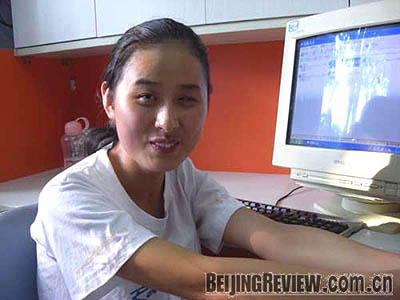|

Song Ying (Photo by CHEN RAN)
"Do you believe that your voice has a color?"
"Yes, I do."
"What is it then?"
"Hmmm...I guess it must be golden; but my teacher says it should be half blue and half purple."
When the interview was on the air last year over the Qingdao School for the Blind in east China's Shandong Province, Song Ying, the DJ and producer of the program, might not have imagined that one day she could become a part-time editor and reporter of a radio program in Beijing.
The color of voice
Born in 1988 in Dezhou City of Shandong Province, Song was diagnosed with congenital low vision in infancy. She entered a normal primary school at the age of seven; and transferred to a special school for children with visual impairments three years later due to a worsening visual condition.
"I started to learn braille; made new friends; and most importantly, was introduced to listen to the radio, which seemed to be a sort of 'magic' to me," Song told Beijing Review.
"Stupid as it may sound, I was totally fascinated as I could not figure out how a box-like thing could air sound after turning on. To be honest, I even thought that there must be someone hiding inside the transistor," Song laughed. "That was probably the very beginning of my love for the radio program--out of curiosity."
She finally became the person "hiding inside the transistor"--a part-time DJ, and later a producer for the school radio station--in her senior high school.
Song still remembered that one day she had a chat with her friends and teacher about colors during the lunchtime break.
"Given that I have low vision and some of my friends have absolutely no sight, we are technically not able to see colors by eyes, but we can feel and imagine it in our hearts," she said.
One of her friends asked her whether she was aware of the color of her voice.
"My answer is 'Definitely yes! It's like golden stripes because I'm a famous student DJ.' I was joking then and we all laughed. After a while, my teacher, a healthy girl in her 20s, said in a serious tone that she thought my voice must be half blue and half purple. 'The blue stands for introversion and shyness while the purple stands for the romantic part inside of you.' I agreed," she giggled.
Inspired by the idea, Song turned it into a program topic by interviewing students in different grades as well as staff.
"During the production process, I felt like I jumped into another world, where it's not dull any more, but a colorful world," she stated.
Not surprisingly, the program won the hearts of its audience.
"I learnt a lot from it, not only limited to basic skills in editing and producing. I became more confident and easy-going as I did interviews with people I knew or had yet to become familiar with; I started to view things from different angles as my position changed from an audience to a program DJ and producer; I cared more about people around me and everyday life, for I had to dig out new ideas for the program; I had a better understanding of communication and team spirit through regular editorial meetings and program preparations; plus, I paid special attention to my pronunciation, which, according to my audiences, still had a 'Shandong dialect'," she continued.
Her efforts paid off. In 2007, she won an award in a radio summer camp designed for people with visual impairment. In July this year, she received an enrollment letter from the Special Education College of Beijing Union University.
"My major is acupuncture and massage, a profession related to traditional Chinese medicine, which is exclusively designed for students with visual problems nationwide like me.
"I've just 'met' with my 14 classmates yesterday and will spend the following five years with them. That's so exciting!"
Eyes of hearts
In fact, Song arrived in Beijing in early August and became a part-time editor and reporter of the "Eyes of Heart Cinema," the country's first and only radio program produced by and narrating movies for people with visual impairments (Movie narration is a form of explaining and describing scene by scene action in a movie to a visually impaired audience, through a full-sighted volunteer).
| 
